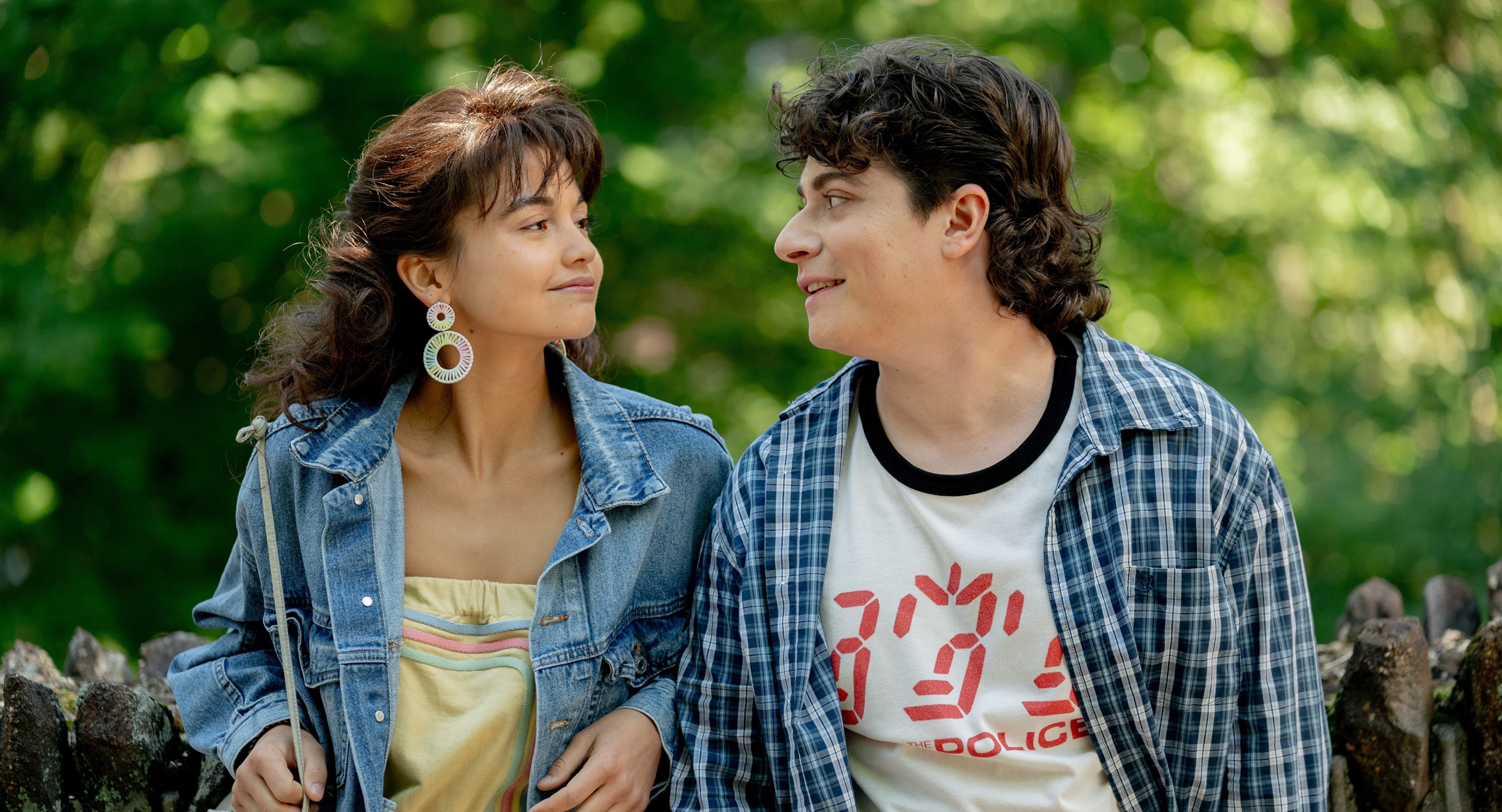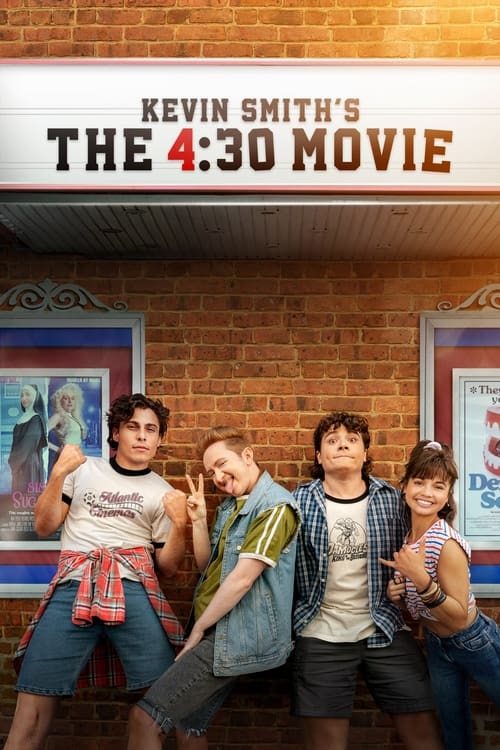The 4:30 Movie – Film Review
Published October 7, 2024

Kevin Smith‘s The 4:30 Movie takes viewers on a humorous, heartwarming journey through the trials of teenage love, friendship, and the transformative magic of cinema. Set in 1986 New Jersey, this semi-autobiographical coming-of-age comedy weaves Smith’s signature humor with a poignant look at adolescence, all wrapped in the nostalgic allure of movie theaters and the rebellious spirit of sneaking into R-rated films. Anchored by an energetic young cast, including Austin Zajur as Brian David and Siena Agudong as Melody Barnegat, the film evokes the awkwardness, hope, and excitement of youth with a distinctively personal touch.
At its core, The 4:30 Movie is a deceptively simple story that unravels over a single day, encapsulating all the anticipation, mistakes, and self-discovery that come with teenage life. Brian David (Zajur) nervously invites his crush Melody to see an R-rated detective comedy, Bucklick, a film adapted from her mother’s favorite book series. This sets off a chain of events that sees Brian, along with his two best friends Burny (Nicholas Cirillo) and Belly (Reed Northrup), embarking on a misadventure at the local Atlantic Cinemas. What begins as a plan to theater-hop their way through a day of films turns into a test of friendships, personal aspirations, and the courage to face both romantic and personal fears.
The premise offers a refreshing sense of innocence. Instead of high-stakes drama or convoluted subplots, Smith keeps the narrative grounded in everyday experiences. It’s about skipping school, awkward phone calls to crushes, petty arguments, and the weight of teenage expectations. The film captures that fleeting moment in life where the world seems both impossibly large and yet intimately small, revolving around close friendships, crushes, and personal dreams.
For fans of Smith’s previous work, The 4:30 Movie carries many of his trademark elements—snappy dialogue, quirky characters, and sharp observational humor. While his earlier films like Clerks and Mallrats delve into the mundanities of young adult life, The 4:30 Movie captures the innocent, youthful era before that—before full-time jobs, before relationships grew more complicated, and before cynicism fully set in. The film feels like a love letter to that time in Smith’s own life when movies were not just a form of escapism but a formative part of his identity.
One of the standout aspects of the film is how Smith uses humor to emphasize the social awkwardness of adolescence. Moments such as Brian’s Emergency Breakthrough calls from his mother, interrupting his date and exposing his juvenile concerns, are pitch-perfect in delivering comedic relief without undercutting the film’s emotional core. At the same time, The 4:30 Movie doesn’t shy away from exploring the growing pains of young friendships. Burny’s increasing frustration with Brian’s budding romance and the group’s banter create tension but also serve as a reflection of how friendships evolve under pressure.
Austin Zajur’s portrayal of Brian is endearing, capturing the essence of the character’s vulnerability and youthful ambition. As the film’s protagonist, Brian is both the moral center and the emotional anchor, guiding the audience through his awkward missteps with a blend of innocence and charm. His tape recorder, a constant companion used to record his thoughts, is a subtle but effective reminder of his aspirations to become a writer, and it underscores the film’s exploration of finding one’s voice, even when life feels overwhelming.
Nicholas Cirillo as Burny delivers a strong performance as the self-proclaimed ladies’ man, bringing humor and bravado to the group dynamic. However, as the film progresses, Burny’s tough exterior is gradually peeled away, revealing insecurities that many will find relatable. His relationship with Brian and Belly is one of the film’s emotional pillars, with Smith carefully balancing comedic banter and more reflective moments. Reed Northrup’s Belly provides additional comic relief, particularly in scenes where he finds himself in absurd situations, such as being thrown out of the theater or caught in embarrassing predicaments. His character’s loyalty to his friends, despite the mishaps, is heartwarming.
Siena Agudong as Melody adds a layer of sincerity and depth to what could have been a one-dimensional love interest. Her chemistry with Zajur is authentic, and her character’s frustrations and hopes are not only tied to her relationship with Brian but also to her own personal struggles. In this way, Smith avoids reducing Melody to a mere plot device, giving her the agency to stand out as her own person within the story.
Ken Jeong’s role as the egotistical manager Mike provides much of the film’s antagonism, but his over-the-top antics and love for banning patrons give the film a cartoonish villain that works within the comedic tone. His clashes with the teenage characters, especially when he wields his authority through the absurdly named “Movie Mobile,” add to the nostalgic charm of small-town America in the 1980s.
At its heart, The 4:30 Movie is a film for movie lovers. Kevin Smith’s deep-rooted admiration for the cinematic experience shines through in every frame. From the fictional Astro Blaster & The Beaver Men to the cheeky sex comedy Dental School, Smith lovingly pokes fun at the kinds of films that populated multiplexes in the ‘80s. The sense of awe and mischief that comes with sneaking into an R-rated film is something many cinephiles can relate to, and Smith uses it as a backdrop to explore the broader theme of finding one’s passion.
But beyond the humor and hijinks, the film also reflects on the bittersweet nature of growing up. Brian’s encounters with the female usher who dreams of being a filmmaker, and the heart-to-heart with Melody in the park, remind the audience that life, much like the movies, is about taking risks. As Brian and his friends struggle with their insecurities, ambitions, and relationships, The 4:30 Movie becomes a story not just about sneaking into theaters but about learning to stand up for oneself and facing the unknown.
While The 4:30 Movie may not break new ground in the coming-of-age genre, it succeeds in delivering a heartfelt and hilarious trip down memory lane. Kevin Smith’s ability to blend humor with moments of emotional sincerity, combined with a charismatic cast, makes this a film that will resonate with both fans of his earlier work and those discovering his unique style for the first time. With its nostalgic setting, witty dialogue, and an ode to the magic of movies, The 4:30 Movie is definitely worth watching.
